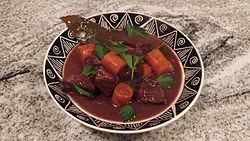Beef bourguignon
 A dish of bœuf bourguignon | |
| Alternative names | Beef Burgundy, bœuf à la bourguignonne |
|---|---|
| Type | Stew |
| Place of origin | France |
| Region or state | Burgundy |
| Main ingredients | Beef, red wine (traditionally red Burgundy), beef stock, lardons, onions, bouquet garni, pearl onions, mushrooms |

Beef bourguignon (US: /ˌbʊərɡiːnˈjɒ̃/) or bœuf bourguignon (UK: /ˌbɜːf ˈbɔːrɡɪn.jɒ̃/;[1] French: [bœf buʁɡiɲɔ̃]), also called beef Burgundy, and bœuf à la Bourguignonne,[2] is a beef stew braised in red wine, often red Burgundy, and beef stock, generally flavoured with carrots, onions, garlic, and a bouquet garni, and garnished with pearl onions, mushrooms, and bacon.[3] It is also a dish consisting of a piece of braised beef with the same garnish, when it may be called pièce de bœuf à la bourguignonne.[4][5][6]
It is a well-known French recipe.[3] The name probably refers to the use of wine, and it is likely not a regional recipe from Burgundy.[7][5][8]
When made with whole roasts, the meat was often larded.[5]
History
The dish is considered "traditional". Although it was documented in the 19th century, beef bourguignon is probably very ancient.[7][8] Other recipes called "à la Bourguignonne" with similar garnishes are found in the mid-19th century for leg of lamb[9] and for rabbit.[10]
The dish has become a standard of French cuisine, notably in Parisian bistrots. It only began to be considered as a Burgundian specialty in the twentieth century.[7]
Julia Child has described the dish as "certainly one of the most delicious beef dishes concocted by man".[11]
Serving
Beef bourguignon is generally accompanied with boiled potatoes[11][5] or pasta.[12]
Name and spellings
In culinary terminology, "bourguignon" is applied to various dishes prepared with wine or with a mushroom and onion garnish in the mid-nineteenth century.[8][9][10]
The dish may be called bourguignon or à la bourguignonne in both French and English.[13][4][5] It is occasionally called beef/bœuf bourguignonne in English,[2][14] but that is considered grammatically incorrect in French.[15]
See also
Notes and references
- ^ Oxford English Dictionary, 3rd edition, 2013 s.v.
- ^ a b Random House Dictionary online at dictionary.com
- ^ a b Prosper Montagné, Larousse Gastronomique, English translation, Crown 1961 s.v. 'beef'/ 'beef ragoûts'
- ^ a b Paul Bocuse, La cuisine du marché, 1980 ISBN 2082000478, p. 182
- ^ a b c d e La cuisine de Madame Saint-Ange, p. 416
- ^ Auguste Escoffier, "Pièce de bœuf à la bourguignonne", A Guide to Modern Cookery, 1907 p. 379
- ^ a b c Jim Chevallier, A History of the Food of Paris: From Roast Mammoth to Steak Frites, 2018, ISBN 1442272821, p. 191
- ^ a b c Pierre Larousse, Grand dictionnaire universel du XIXe siècle, 2, 1867 s.v.
- ^ a b A French Lady, "Gigot à la Bourguignonne", Cookery for English Households, 1864, p. 139
- ^ a b Charles Elmé Francatelli, "Rabbits, à la bourguignonne", The Modern Cook, 1846 p. 320
- ^ a b Julia Child, Mastering the Art of French Cooking 1:315 ISBN 0394721780, 1961
- ^ Robert Hamburger, Paris Bistros: A Guide to the Best, 1995, ISBN 0880014172, p. 86
- ^ Wayne Gisslen, Le Cordon Bleu Professional Cooking, Fifth Edition, 2003
- ^ Sharon Tyler Herbst, Food Lover's Companion, Third Edition, 2001
- ^ Usage in Google ngrams
